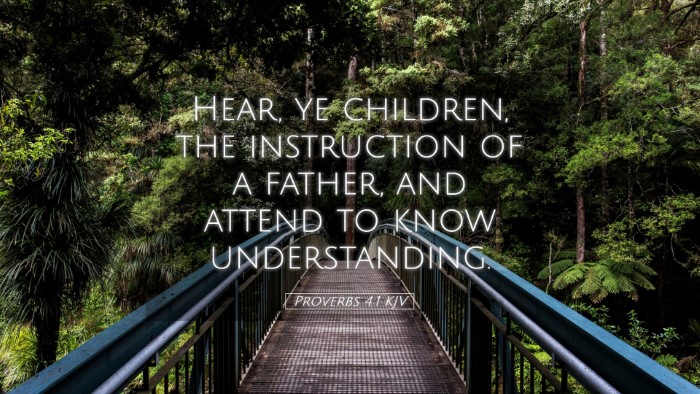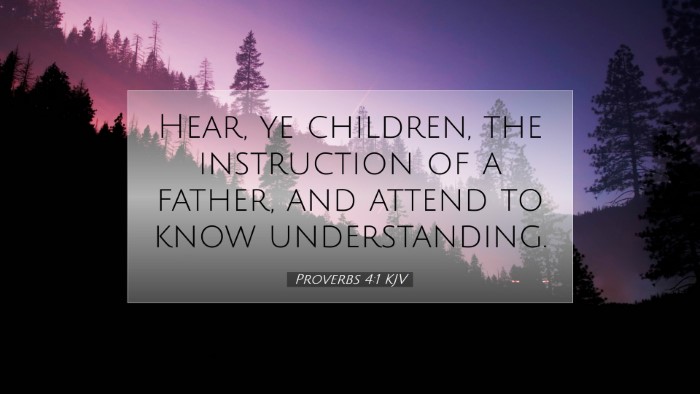Commentary on Proverbs 4:1
Verse: "Hear, ye children, the instruction of a father, and attend to know understanding."
Introduction
This verse from Proverbs sets the foundation for a father's earnest plea to his children to engage with his teachings. It encapsulates the essence of wisdom and its transmission from parent to child. Various public domain commentaries unpack the richness of this verse, highlighting its theological significance and practical implications.
Contextual Analysis
This verse is situated within the context of Proverbs, a collection of wisdom literature attributed primarily to Solomon. The chapter emphasizes the importance of parental guidance and the acquisition of wisdom, which is depicted as a protective and guiding force in life.
Insights from Matthew Henry
Matthew Henry emphasizes the role of a father in imparting instruction to his children. He notes that:
- Authority of the Father: The father is to be viewed as an authority figure whose teachings are rooted in experience and divine wisdom.
- Call to Listen: The imperative "hear" signifies the importance of active listening and engagement with the lessons being taught.
- Value of Understanding: Understanding is depicted as more valuable than material wealth; it is essential for a well-lived life.
Insights from Albert Barnes
Albert Barnes elaborates on the phrase "instruction of a father," suggesting that the instruction ought to be heeded with diligence. He emphasizes that:
- Parental Guidance: The role of the father is not merely to command but to guide children toward discernment and wisdom.
- Spiritual Instruction: This instruction is not limited to earthly matters but encourages a spiritual understanding and a relationship with God.
- Obedience and Consequence: Attending to these teachings may have eternal consequences, aligning one's life with divine principles.
Insights from Adam Clarke
Adam Clarke offers a nuanced interpretation of the instruction referenced in this verse. According to Clarke:
- Emphasis on ‘Attend’: The call to "attend" indicates not just passive hearing but an active commitment to understanding the instruction given.
- Role of Wisdom: The instruction given is not just for knowledge but aims to instill wisdom, which can lead to a prosperous life.
- Cultural Context: In ancient Israel, wisdom and understanding were both cultural and spiritual imperatives expected to be transmitted from one generation to the next.
Theological Implications
Theological reflection on this verse reveals that:
- God as the Ultimate Father: The instruction of earthly fathers reflects the greater relationship between God and humanity, wherein God is seen as a Father imparting wisdom.
- Importance of Listening to God: Just as children are urged to listen to their parents, believers are called to heed God’s word and guidance.
- Wisdom as a Divine Gift: There is a recognition that true understanding is a gift from God, aligning with James 1:5 which encourages seeking wisdom from God.
Practical Applications
For pastors, students, and theologians, the lessons gleaned from Proverbs 4:1 suggest several practical applications:
- Promoting Family Discipleship: Encouraging families to engage in spiritual discussions can facilitate the transfer of wisdom from one generation to the next.
- Prioritizing Wisdom over Knowledge: Emphasizing that understanding involves not just acquiring information but integrating spiritual truth into daily life.
- Fostering a Listening Community: In church settings, creating an environment where scripture is studied and discussed encourages deeper understanding and spiritual growth.
Conclusion
Proverbs 4:1 serves as a critical reminder of the value of wisdom and the role that fathers (and by extension, parents) play in imparting this understanding to their children. By heeding this instruction, children are not only prepared for the challenges of life but also positioned to seek God’s wisdom, thereby enriching their spiritual journey. The insights from Matthew Henry, Albert Barnes, and Adam Clarke collectively underscore the enduring significance of parental guidance in spiritual development.


